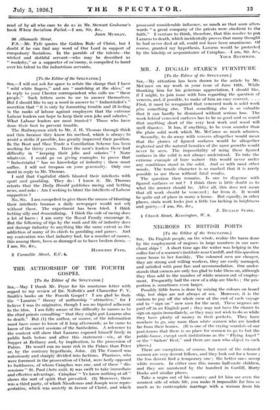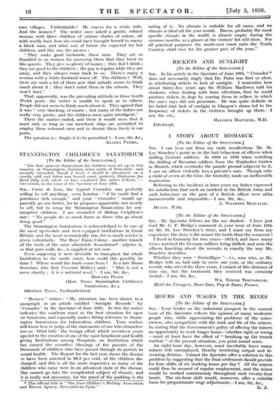NEGROES IN BRITISH PORTS
[To the Editor of the SPECTATOR.]
Sin,---Do English people, on the whole, realize the harm done by the employment of negroes in large numbers in our mer- chant ships ? A short time ago the writer was helping in the coffee-bar of a seamen's institute near Cardiff, and this question came home to her forcibly. The coloured men are cheaper, they arc strong and willing workers, they are easily managed, and satisfied with poor fare and accommodation. One under- stands that owners are only too glad to take them on, although they thus add to the number of white seamen out of employ- ment. Frequently half the crew of a ship arc blacks ; the pro- portion is sometimes even larger.
Possibly little harm is done by mixing the colours on board ship, but ships are not always at sea. Moreover, it is the custom to pay off the whole crew at the end of each voyage and to "sign on" new Men for the next. These negroes are paid off in an English port ; they may not have the chance to sign on again immediately, or they may not wish to do so while they have plenty of money in their pockets. They have nowhere to go, any more than white seamen who are landed far from their homes. (It is one of the crying scandals of our port-towns that there is no place for seamen to go to but the public-house, except such institutions as the " Flying Angel" or the "Sailors' Rest," and there are men who object to such places.)
There are exceptions, of course, but Most of the coloured seamen are very decent fellows, and tIwy look out for a home ; the- less decent find a temporary one ; the better ones marry white women. In either ease this means half-caste children, and they arc numbered by the hundred in Cardiff, Barry Docks and similar places.
Take a negro out of his country and let him see even the meanest side of white life, you make it impossible for him so much as to contemplate marriage with a woman from his own villages. Unthinkable ! He craves for a white wife. And the women ? The writer once asked a gentle, refined woman with three children of various shades of colour, all with woolly hair, how she could have brought herself to marry a black man, and what sort of future she expected for her children, and this was the answer : "They make good husbands, those men. They are so thankful to us women for marrying them that they treat us like queens. They give us plenty of money ; they don't drink ; they are good to the children ; the pay is regular while they are away, and they always come back to us. There's many a woman with a white husband worse off. The children ? Well, there are such a lot of them now that nobody seems to think much about it ; they don't mind them in the schools. They won't hurt."
That, apparently, was the prevailing attitude in those South Welsh ports-- the writer is unable to speak as to others. People did not seem to think much about it. They agreed that it was "very shocking, of course ; but many of the babies are really very pretty, and the children seem quite intelligent."
There the matter ended, and there it would seem that it must end, so long as our merchant ships are permitted to employ these coloured men and to decant them freely in our ports.
The question is : Ought it to be permitted ?--I am, Sir, &c., AGATHA PEMBA.











































 Previous page
Previous page